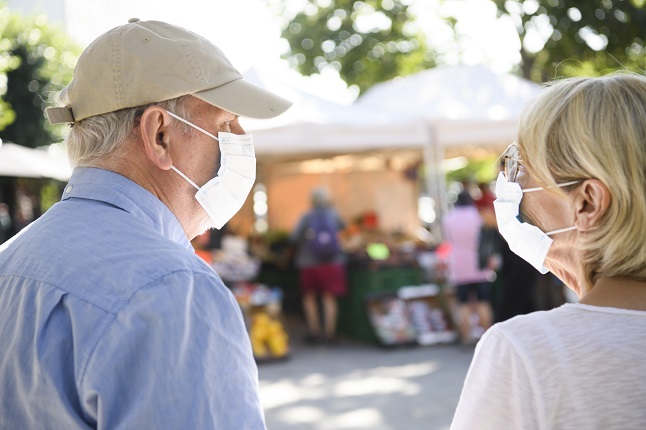In its own FAQs, the Public Health Agency says it “declines to recommend” the use of face masks outside the health and care sector, making it one of the few countries in the world not to recommend masks.
The agency's director-general Johan Carlson addressed the issue in Tuesday's press conference, stating that the agency did believe masks can work in preventing infection and may recommend them in certain situations in future.
This comes after state epidemiologist Anders Tegnell told The Local earlier this month: “There might be situations where face masks might be a good addition to other things; when you see an outbreak starting up, if you have places where you can't avoid crowding and so on, there might be a need for face masks.”
Further guidance on face mask use, and specifically on situations where it might be recommended to reduce spread of coronavirus infection, will be elaborated in an upcoming report the agency will present to the government.
But while not recommending them as a blanket measure, Carlson did state that masks are effective in reducing spread of disease, even saying that those people who choose to wear them in Sweden likely do so correctly.
“It's obviously not the case that the Public Health Agency doesn't think face masks are an effective way of preventing spread of infection; they're a measure recommended in the health and care sector,” he told media.
“The problem is that use of face masks among the general population are a much harder question; in which contexts they should be used and what effect they have on other important pillars in our strategy.”

Public Health Agency head Johan Carlson made the new comments on face masks at Tuesday's press conference. Photo: Jessica Gow/TT
Responding to a question from broadcaster TV4, Carlson said the agency had never explicitly advised against wearing masks, “but it's another thing to advise the whole population to wear masks,” Carlson added.
A study earlier in summer showed that just two percent of the Swedish population as a whole were wearing face masks due to the coronavirus, but that figure rises to 15 percent in some of the country's poorer areas, which typically have a far higher level of people born overseas as well as more crowded housing.
“I see few risks with people who wear them of their own initiative, they're perhaps more aware [of how to use them safely],” Carlson said. “But going over to using face masks as a main part of the strategy would be problematic.”
“If volunteers want to wear masks and are fully aware of the situation, of course that's not negative. The negative thing is you have to convey this message to millions of people who are not knowledgeable of when or how to use them, you need a lot of education and you need to find the right moments and areas,” Carlson clarified later in the press conference to Radio Sweden.
“The thing is to find the right moment, the right place. It's not sustainable, people are not prepared to wear masks for a long time.”
These right moments could be response to future local outbreaks, where stricter measures may be introduced, he said, or in high-risk situations where people cannot avoid close face-to-face contact with strangers. That might include visits to the opticians or dentist or in crowded public transport.
Asked by a reporter why the agency had chosen not to advise masks in certain situations – such as on crowded public transport in rush hour – Carlson said this placed too much responsibility on individuals to assess the risk, and increased the likelihood of companies and individuals opting not to adhere to existing requirements aimed at reducing crowding in the first place.
“I don't want to give a carte blanche to public transport companies and say 'now we can fill up our buses and trains because we have face masks', then we'd have a worse situation. It's possible to reduce crowding in other ways, increase capacity, have people walk two kilometres or cycle instead – the impact of that is much greater than that of face masks. But there may be situations [where crowding can't be avoided], and that should be solved in the first instance through dialogue with local partners.”
“We want to look at how the situation develops. If we don't get a big increase in traffic, or clear crowding… and we also want to differentiate. We've been asked [by the government] to look into varying measures across the country, and this question would be suitable for that. It probably wouldn't be reasonable to have the same recommendation in Gothenburg as in smaller places that don't have the same problems. We don't want to require use where it's not needed,” he said, adding that this risked creating a 'fatigue' with the measures as a whole, due to the physical discomfort of masks.



 Please whitelist us to continue reading.
Please whitelist us to continue reading.
Visit the dentist with a mask?! I never questioned the sense of humor of Swedes, but this is….